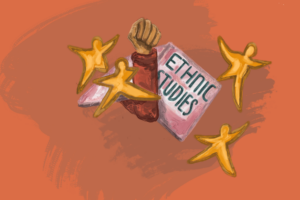Georgetown’s board of directors announced on Feb. 29 that Georgetown’s Department of African American Studies will now be known as the Department of Black Studies. The change is intended to allow faculty and students to engage in curriculum beyond the African American identity, instead seeking to understand global Black experiences.
“As there continues to be immigration to America from the Caribbean, South America, and Africa from people who will be racialized as Black when they get here, no matter what their ethnic heritage is, African American as a term can sometimes cover over the experiences of Black folks who aren’t American,” Zandria F. Robinson, a professor in the department, wrote in an email to the Voice.
The change comes eight years after the Department of African American Studies was created in 2016. This past year, as faculty members engaged in planning for the future of the department, they decided that changing its name would best reflect its mission.
“This was a faculty-generated process,” Robinson wrote.“The name change was decided upon after careful consideration of who we are as a department vis-a-vis our faculty specializations, of the state of the field, and of how a name change might bring us in alignment with the field and our faculty.”
Prior to the declaration of the name change, the department had already been incorporating curriculum that reaches beyond the African American community.
“From a curriculum perspective, the name change is both reflective of what we already do, say like our colleague Professor Melanie White, whose work is at the intersection of Black Studies and Latin American Studies, and aspirational towards our desires to continue to expand the geographical reach of Black Studies — which includes all people who are racialized as Black by a western colonial paradigm,” Robinson wrote.
Several professors believe that the change is significant to their specific field of expertise that relates to other identities of Blackness, beyond the African American identity.
“Most of my scholarship and creative activity relates to African diaspora people who live in other countries – Mexico, Honduras, South Africa, the Caribbean, Ethiopia and England. It is so important to include these populations in discussions of diaspora and racial justice,” Anita Gonzalez, a professor in the department, wrote in an email to the Voice. “At least 70% of enslaved Africans went to South America and the Caribbean, and understanding the histories and politics of other cultures who continuously interacted with African Americans broadens the perspective.”
In their scholarship, many professors already acknowledge that the Black experience extends beyond the United States.
“As an American urbanist and popular culture scholar, I am always in conversation with scholars with Black Atlantic perspectives that challenge the sometimes U.S.-first perspectives of the field,” Robinson wrote.
Students studying in the department say they appreciate the name change, and emphasized the importance of the decision.
“I feel like it shows just how progressive the department is becoming. Especially because we just became a department in 2016, which is crazy. But I just feel it shows how much we’re trying to encapsulate the full range of what Blackness is. It’s not just [about] being in America, Black people come from everywhere,” Autumn Davis (CAS ’24), a major in the department, said.
Students are also hopeful that the change will encourage the department to employ more professors that have an expertise in fields related to different Black ethnicities. This will hopefully encourage more students to major or minor in the department.
“I feel like it won’t change the course of the discipline itself, but it may entice more people to want to join the program, want to join the major, the minor and everything and take courses within the department,” Davis said.
Professors hope that the new Department of Black Studies represents a new horizon for their scholarship campus.
“We need this change because the African descendant experience is diverse and multi-faceting and limiting ourselves to African American history, culture and politics misrepresents the global interactions, networks and support systems that have always been a part of African American history and culture,” Gonzalez wrote.




